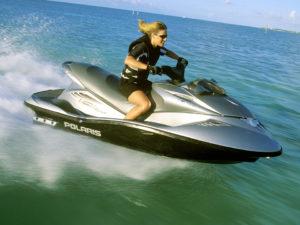PWC Safety Regulations – Michigan
Personal watercraft operators in the state of Michigan, along with anyone else riding on board, must wear a USCG approved Type I, II, or III life jacket; an inflatable personal floatation device is not allowed. Being aware of the boating safety requirements for your boat, extends to personal watercrafts as well.
Children under the age of 7, shall not be towed or ride on a PWC without the parent, guardian, or designated adult being on board with the child.
Children under the age of 14 may not operate a PWC legally alone. Those who are 14 and 15 may operate a PWC only if they have a Boating Safety Certificate and either have a parent, guardian, or designated adult over 21 years of age on board, or if operating a PWC on their own, must be within 100 feet of their parent, guardian, or designated adult. Persons 16 years of age can operate the PWC as long as they have received a Boating Safety Certificate and those over 16 can operate PWC with no limitations.
While riding the PWC, all operators must have a lanyard attached to their life jacket, their person, clothes and attached to the vessels ignition switch.
Riding a PWC is illegal during the hours from sunset and 8 a.m. with the determination of exactly what time “sunset” is by the National Weather Service.
Personal watercrafts are to be operated at slow speed as to not make wakes, when crossing within 150 feet behind another vessel with the exception of another PWC. Operators of a PWC are not allowed to be within 200 feet of a Great Lakes shoreline except at a slow, no wake speed and moving perpendicular to the shore.
Other than when docking or launching a PWC, an operator must not ride in water less than two feet deep; and then they must remain at a slow, no wake speed.
Harassing wildlife or disturbing aquatic vegetation with a PWC is not allowed, and is illegal in the state of Michigan.
For more information specific to PWC’s, go to The Handbook of Michigan Laws and Responsibilities.



